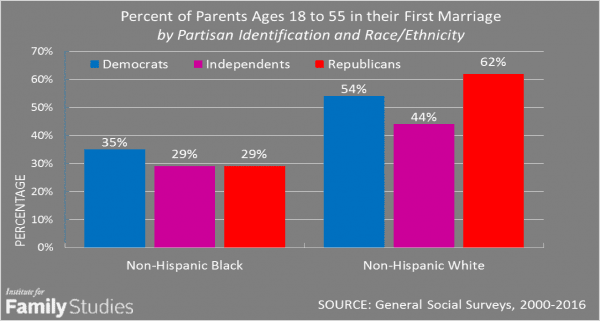Blue America More Virtuous Than Red? Nope

Writing in Politico, University of Virginia sociologist Brad Wilcox demolishes the popular liberal myth that Republicans talk big about “family values,” but Democrats actually have more stable families. Responding to a Nicholas Kristof column asserting this, Wilcox writes, in part:
Here, Kristof is indebted to a book by family scholars Naomi Cahn and June Carbone, Red Families v. Blue Families, which makes the case that blue states have more successful and stable families than do red states. Arkansas, for instance, has one of the highest divorce rates in the nation, whereas Massachusetts has one of the lowest. Cahn and Carbone go on to contend that blue families, more than red families, “encourage their children to simultaneously combine public tolerance with private discipline, and their children then overwhelmingly choose to raise their own children within two-parent families.” In other words, blue Americans are more successful at forging exactly the sort of stable, two-parent families that red Americans say they support.
But this state-based argument obscures more than it illuminates about the links between partisanship and family life for ordinary families in America. Scholars and journalists who have bought into the idea that red Americans are hypocrites on family values because some red states do poorly when it comes to family stability are committing what is called the “ecological fallacy” of conflating the family behaviors of individual conservatives with the family behaviors of states dominated by conservatives. So, while it is true that Republican states in the South have more family instability that Democratic states in the North, that does not mean that Republicans as individuals necessarily have more unstable families than Democrats as individuals.
More:
In other words, even though Southerners in general are at greater risk of family instability than Northerners, Republicans in the South enjoy markedly higher levels of family instability [sic — this must be an error — RD] than their fellow citizens— a family stability advantage that puts them above Democrats and Independents in the North. Another way to put this: It’s blue and purple Americans in the South who are really pulling down family stability in the South, not red Americans.
Race and ethnicity have something to do with it. In deep-red Louisiana, for example, 33 percent of our people are black. I couldn’t find a statistic showing the out-of-wedlock birth rates among races in this state, but nationally, 73 percent of all black babies are born to single mothers, and 67 percent of black children live in single-parent homes (source here). Not counting DC, and counting Maryland as Southern, the 13 biggest states by percentage of black population are in the South. Only Delaware, at No. 9, is un-Southern. On the 2016 electoral map, of those Southern states that are home to a large percentage of African-Americans, only Virginia and Maryland turn up as blue.
The point is this: states with relatively high percentages of African-Americans are going to score higher on family instability. And black folks aren’t known for voting Republican. To call a state a “Red State” does not mean it is uniformly so, throughout its population.
Despite all that, even among whites alone, Republicans have more stable family situations than Democrats or Independents:

The good news is that the out-of-wedlock birth rate, and the teen pregnancy rate, are both declining across the board. Still, there’s plenty enough family instability all over, in every state, among every race, and within all political groupings. But blue-state liberals who call red-state conservatives hypocrites on family values are flat-out wrong.
Calling individual red-state conservative politicians hypocrites on family values — well, that’s a different story.
Subscribe for as little as $5/mo to start commenting on Rod’s blog.